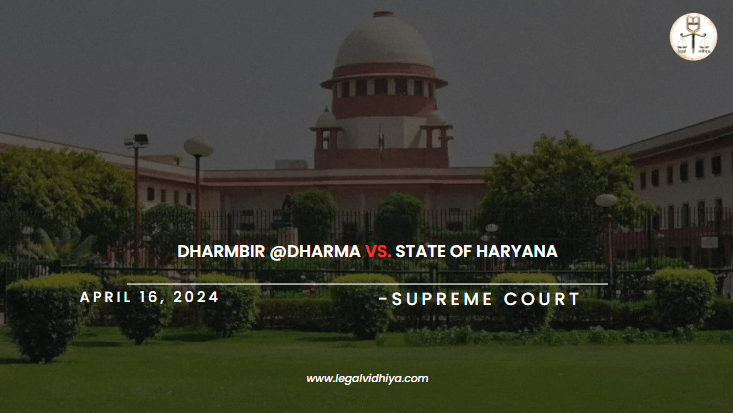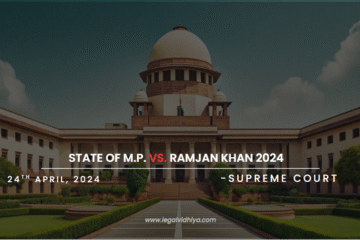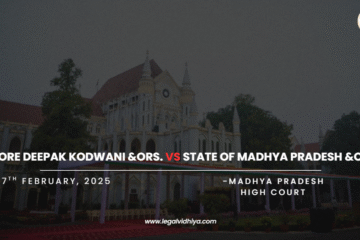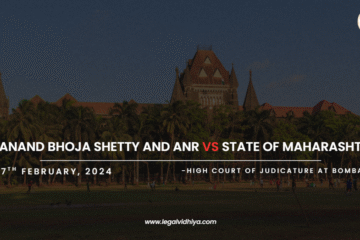
| CITATION | Appeal No. 1858 of 2009 |
| DATE OF JUDGMENT | April 16, 2024 |
| COURT | Supreme Court of India |
| APPELLATE | Dharmbir @Dharma |
| RESPONDENT | State of Haryana |
| BENCH | B. R. Gavai, Aravind kumar |
INTRODUCTION
The case Dharambir@ Dharma vs. State of Haryana saw a significant turn of events. In this case, involved parties are Karambir (Deceased) was together with his brother Krishan Kumar (pw-5), Ravinder (pw-6), and two acquaintances (Mahendra and Suresh).On June,1998 at approximately 11:30 a.m. the accused Dharambir allegedly stabbed Karambir in the chest, resulting in his immediately death. The motive was suspected Dharmbir’s belief that Karambir has an illicit relationship with his wife. The case investigated by the Rohtak Singh(pw-11) Rohtak Singh received a phone call about the incident by the Ram kumar (pw-9) who was manager of prabhat cinema, and arrive at the scene to record krishna kumar statement, leading to the FIR. Investigation included Inspecting the crime scene,sizing the knife, preparing the side plan, and recording witness statements. The autopsy by Dr.Hemant Singh(pw-1) revealed two evidence wounds, determining the death as shock and hemorrhage from the chest wound. appellant, who was convicted under section 302 of Indian penal code by a session judge and later by the High court, was acquitted by the Supreme Court. The decision was based on the lack of conclusion evidence presented by the prosecution. The appellant’s innocence has been upheld in a crucial legal battle that highlights the importance of fair trial and evidence based justice.
FACT
- The appellant was convicted under section 302 IPC by a session judge of bhiwani. Sentenced to life imprisonment and fine by session judge.
- Appeal filed (criminal Appeal No. 259-DB of 1999) in Punjab Or Haryana High Court. High Court Upheld conviction and sentence as per the Division Bench.
- Appellant’s appeal against the High Court decision is subject to challenge in present appeal.
- On 5 June, 1998 at around 8:30 a.m. the deceased Karambir along with his brother and acquaintances went to Prabhaat Cinema, Bhiwani.
- The accused, allegedly stabbed Karambir in the chest, resulting the incident the Karambir immediate death and leaving the knife behind the field of the scene.
- The accused had a motive for the crime as he suspected the deceased of having illicit relations with his wife.
- The accused was arrested on 7 June 1998 and a chahesheet was filed against him.
- The case went to trial, and the prosecution relied on witnesses like the first information and a witness to an extra judicial confession by the accused.
- The accused denied the charges during the trial and claimed innocence. The trial court ultimately convicted the accused based on the evidence presented.
ISSUES RAISED
- Are the statements of the witness consistent with each other and with other evidence present in the case?
- How detailed and specific are the testimonies? Are there clear accounts of the incident?
- Are there any contradictions or admissions that could undermine their statements?
CONTENTION OF APPELLANT
- Contradiction in witness testimonies regarding seating arrangements in the cinema hall.
- Witness and the deceased were seated in the first row reserved for women, but the investigation officer found the deceased seated ahead of them.
- The alleged extra judicial confession by the accused was deemed weak evidence, contradicted by witness statements.
- Inconsistencies in witness accounts regarding blood stains on clothes raise doubts about their presence at the crime scene.
- Two companions of the informant did not support the prosecution case and were declared hostile witnesses.
- The accused’s alleged confession before witnesses was contradiction by the witness, manager of prabhaat cinema, and the Investigation officer.
- Absence of examination of a key witness like the gatekeeper raises concerns about withheld material evidence.
- Inconsistencies in witness statements regarding the accused’s action post- incident raise question about the reliability of evidence.
- Krishan kumar (pw-5), being closely related to the accused and the deceased, makes it unlikely for him to falsely implicate the accused.
CONTENTIONS OF RESPONDENTS
- The testimonies of krishan kumar (pw-5), Ram kumar (pw-8) are crucial for upholding the conviction of the appellant.
- Ram kumar (pw-8), the ex sarpanch provided compelling evidence supporting the factum of extra- judicial confession made by the accused, corroborating krishan kumar’S testimony.
- The judgments of the trial court and the high Court, with concurrent findings of facts, have no apparent infirmities leading to the dismissal of the appeal sought by the accused.
- The state asserted that without the testimonies of krishan kumar (pw-5), and Ram kumar (pw-8), there was insufficient evidence to maintain the appellant’s convictions.
- The natural and trustworthy nature of krishan kumar’s testimony as the deceased real brother was highlighted urging the Court to uphold the conviction.
JUDGEMENT
The judgment provided by the Supreme Court included a detailed analysis of the witness testimonies, medical evidence, and investigative procedures to reach its final decision on the culpability of the accused under Section 302 IPC.
The conviction of the appellant by the trial court and affirmed by the High Court cannot be sustained. The appellant is acquitted by giving him the benefits of doubt. The appeal is allowed and the bail bonds are discharged.
The impugned judgment by the High court and trial court are quashed and set aside. The appellant is acquitted of charge.
ANALYSIS
The two star prosecution witnesses. Krishan kumar (pw-5) and Ram (pw-8) were deemed. Wholly unreliable, making it unsafe to rely on their evidence to affirm the guilt or the accused appellant.
Contradiction and inconsistencies were identified in the testimonies of krishan kumar particularly regarding his presence at the prime scene.
The motive presented by krishan kumar (pw-5) for the incident was dispatch and his version of events did not have substantial corroboration.
The evidence relating to the accused alleged. Extra judicial confession was deemed weak and lacked independent verification.
Witness statements and timelines surrounding the incident were scrutinized for discrepancies, casting doubt on the prosecution’s narrative.
The prosecution failed to prove the guit of the accused appellant beyond or reasonable doubt.
The charge against the accused appellant was not established.
CONCLUSION
The Court concluded that, it is evidence that the prosecution did not succeed in proving the guilt of the accused appellant beyond a reasonable doubt.
The appellant is entitled to be acquitted receiving benefit of doubt.
Thus, the appeal is accepted and the judgment of both the trial court and the high Court quashed and set aside. The appellant is acquitted of the charges. Since the appellant is on bail, there is no need for him to surrender and his bail bonds are discharge, any pending application are hereby disposed of.
REFERENCE
- https://indiankanoon.org/doc/1206604
- https://primelegal.in/wp-content/uploads/2024/04/Dharambir-@-Dharma-v.-State-of-Haryana.pdf
- https://www.the-laws.com/encyclopedia/browse/case?caseId=004202503000&title=dharambir-dharma-vs-state-of-haryana
This Article is written by Rachna Singh student of faculty of law, University of Delhi; Intern at legal vidhiya.
Disclaimer: The materials provided herein are intended solely for informational purposes. Accessing or using the site or the materials does not establish an attorney-client relationship. The information presented on this site is not to be construed as legal or professional advice, and it should not be relied upon for such purposes or used as a substitute for advice from a licensed attorney in your state. Additionally, the viewpoint presented by the author is of a personal nature.




0 Comments